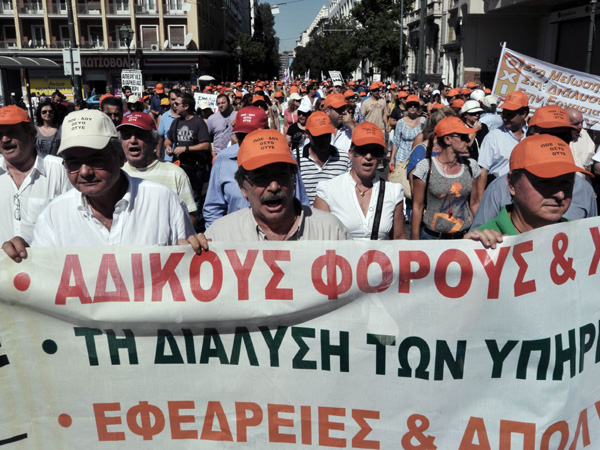
Finance Ministry, tax office and customs employees march in central Athens to protest new austerity measures on September 27, 2012. Greece’s three-party coalition government agreed on the “main points” of 13.5-billion-euro ($17.4 billion) austerity package, tied to the release of vital EU-IMF rescue loans. AFP / LOUISA GOULIAMAKI
ATHENS – Greece enters the final stretch on a tough new round of austerity cuts with the return of creditor auditors this week after a breakthrough in arduous talks between its political leaders.
Senior representatives from the EU, the IMF and the European Central Bank – Greece’s so-called ‘troika’ of creditors – return to Athens on Sunday.
They had given the coalition government of Prime Minister Antonis Samaras a week to finalize the austerity package worth 13.5 billion euros ($17.5 billion) in order to unlock 31.5 billion euros in frozen EU-IMF loans.
The support funds, part of a Greek bailout worth 130 billion euros overall, had been suspended in May when reforms ground to a halt in a political stalemate as the country held double elections before a government could be formed.
Samaras has been trying to overcome opposition from his socialist and moderate leftist parties allies in government, who have warned against imposing sweeping new cuts on a nation already slogging through a third year of austerity.
They have urged the conservative PM to extract as many concessions as possible from the ‘troika’, chief among them a two-year extension to 2016 in order to ease out the fiscal overhaul.
“Applying the measures to 2016 instead of 2014 is enormously important,” said socialist leader Evangelos Venizelos, one of the three coalition partners.
“Spreading the measures over four years will make them milder,” he said, arguing that giving the Greek economy more time to start performing should enable the government to mitigate the sweep of the cuts.
After weeks of abortive talks, Finance Minister Yannis Stournaras on Friday said the coalition had agreed on the “main points” of the austerity package and that the approval of the ‘troika’ and of Greece’s EU peers was now required.
Eurozone finance ministers are meeting on October 8, and a European Union summit on October 18 and 19 is expected to decide on the Greek request for a two-year extension, which EU and IMF officials say may require extra funding.
According to a finance ministry source, the package includes around seven billion euros in cuts affecting higher pensions, benefits and the salaries of better-paid civil servants such as judges, professors and police officers.
Another 3.5 billion euros is to be saved from organisational reforms and the early retirement of 15,000 civil servants.
And a further three billion euros is to be raised in additional taxes.
The package was presented by head of Greece’s financial experts team, Panos Tsakloglou, at a euro working group meeting in Brussels on Thursday, the finance ministry source told AFP.
It is to be submitted alongside the draft 2013 budget to parliament on Monday.
Doctors, lawyers, journalists, teachers and even state security staff have staged strikes and walkouts this month against the new measures.
After two years of austerity, nearly one in four Greeks is unemployed according to official figures which unions say only give a partial picture.
On Wednesday, police clashed with masked youths in Athens during a general strike and demonstrations that drew some 34,000 people to the city centre.
Police said they had made 23 arrests, including 10 minors.
Another 18,000 people protested in the northern city of Thessaloniki according to police.